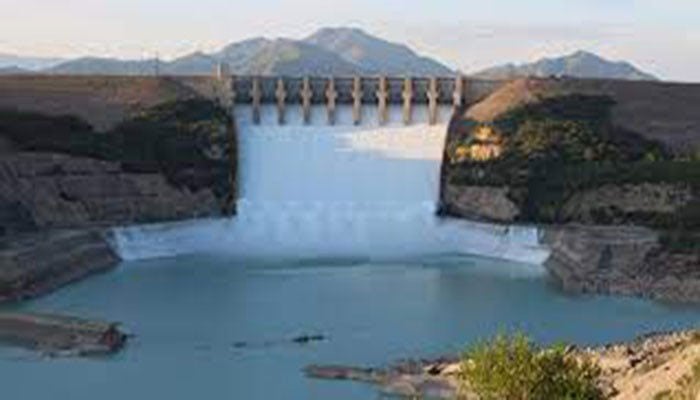Amid protest from Sindh: IRSA enforces three-tier formula for Rabi season
ISLAMABAD: The IRSA (Indus Water System Authority) here on Tuesday finalised water distribution under three-tier formula for the Rabi season from October 1, 2021 to March 31, 2022 with water shortage of 28 percent.
However, the Sindh member registered a protest against the decision, saying that the three-tier formula does not exist in the Water Apportionment Accord 1990 and the IRSA Act. He said with this decision, IRSA has held the water accord in abeyance.
Sindh and Punjab each will share 28 percent water deficit. However, KP and Balochistan will remain exempted from any shortages. The Sindh Member in IRSA, Zahid Hussain Junejo, confirmed submitting his protest against the IRSA decision during the Rabi season. He said the implementation of three-tier formula was tantamount to breaching the water accord.
However, other officials who attended the meeting, in response to the protest by the Sindh member, said the member from Punjab and others had stated that since the issue of three-tier formula was pending before the CCI (Council of Common Interests), IRSA can implement the three-tier formula, until the body decides about it.
The three-tier formula comes into force when the water availability goes below 103 Million Acre Feet and the water distribution is made under 14-B. If the water availability goes more than 103 MAF and reaches 104 MAF, then water distribution is made under para-2 of the accord. And if the water availability goes more than 104 MAF, then water is distributed under para-4 of the accord, which is used when there is a flood-like situation in the country.
However, sources in the IRSA Secretariat said that they were not expecting Sindh’s participation in the meeting, but the Sindh member not only participated but also submitted his protest and remained in attendance in the meeting. In an earlier meeting of the advisory committee of IRSA held on September 30, 2021, the Sindh delegation had walked out of the meeting, alleging IRSA of making up its mind to distribute the water under the three-tier formula, violating the spirit of water accord and IRSA Act.
The Spokesman of IRSA, Idrees Khalid Rana, said during the Rabi season 2021-22, the country will have an estimated water availability of just 26.911 MAF. The stored water till September 30, 2021 stood at 7.414 MAF, which includes Mangla Dam 3.5 MAF water, Tarbela Dam 3.8 MAF and Chashma Barrage 0.16 MAF. Punjab will have the share of 14.361 MAF, Sindh 10.827 MAF, KPK 0.701 MAF and Balochistan 1.022 MAF during the Rabi season. The water losses were estimated by the IRSA advisory at 2.044 MAF while the Kotri downstream release are estimated at 0.52 MAF during the desilting of canals.
In the meeting, Balochistan demanded additional water of 1.026 MAF apart from its share arguing that in the Kharif season Sindh had not provided its share. The IRSA advisory committee asked Balochistan to come up with a working paper in the next meeting. He also said that IRSA has allowed Wapda to carry out construction work at T-3 and T-4 and during the process, water level at Tarbela will be kept below from 1,411 feet. However, IRSA and the provinces have not endorsed the proposal for the construction of T-5 project, which will take two years from May 2022, saying the construction work at T-5 will reduce the water supply to the provinces up to 75,000 cusecs per day, which is not acceptable to them, leading the issue to be deferred.
However, IRSA has asked IWMI (International Water Management Institute) to present ToRs next week for common discharge measurement of water, saying this decision was taken after getting a nod from Sindh. Punjab is already in favour of this initiative.
-
 King Charles ‘very Much’ Wants Andrew To Testify At US Congress
King Charles ‘very Much’ Wants Andrew To Testify At US Congress -
 Rosie O’Donnell Secretly Returned To US To Test Safety
Rosie O’Donnell Secretly Returned To US To Test Safety -
 Meghan Markle, Prince Harry Spotted On Date Night On Valentine’s Day
Meghan Markle, Prince Harry Spotted On Date Night On Valentine’s Day -
 King Charles Butler Spills Valentine’s Day Dinner Blunders
King Charles Butler Spills Valentine’s Day Dinner Blunders -
 Brooklyn Beckham Hits Back At Gordon Ramsay With Subtle Move Over Remark On His Personal Life
Brooklyn Beckham Hits Back At Gordon Ramsay With Subtle Move Over Remark On His Personal Life -
 Meghan Markle Showcases Princess Lilibet Face On Valentine’s Day
Meghan Markle Showcases Princess Lilibet Face On Valentine’s Day -
 Harry Styles Opens Up About Isolation After One Direction Split
Harry Styles Opens Up About Isolation After One Direction Split -
 Shamed Andrew Was ‘face To Face’ With Epstein Files, Mocked For Lying
Shamed Andrew Was ‘face To Face’ With Epstein Files, Mocked For Lying -
 Kanye West Projected To Explode Music Charts With 'Bully' After He Apologized Over Antisemitism
Kanye West Projected To Explode Music Charts With 'Bully' After He Apologized Over Antisemitism -
 Leighton Meester Reflects On How Valentine’s Day Feels Like Now
Leighton Meester Reflects On How Valentine’s Day Feels Like Now -
 Sarah Ferguson ‘won’t Let Go Without A Fight’ After Royal Exile
Sarah Ferguson ‘won’t Let Go Without A Fight’ After Royal Exile -
 Adam Sandler Makes Brutal Confession: 'I Do Not Love Comedy First'
Adam Sandler Makes Brutal Confession: 'I Do Not Love Comedy First' -
 'Harry Potter' Star Rupert Grint Shares Where He Stands Politically
'Harry Potter' Star Rupert Grint Shares Where He Stands Politically -
 Drama Outside Nancy Guthrie's Home Unfolds Described As 'circus'
Drama Outside Nancy Guthrie's Home Unfolds Described As 'circus' -
 Marco Rubio Sends Message Of Unity To Europe
Marco Rubio Sends Message Of Unity To Europe -
 Savannah's Interview With Epstein Victim, Who Sued UK's Andrew, Surfaces Amid Guthrie Abduction
Savannah's Interview With Epstein Victim, Who Sued UK's Andrew, Surfaces Amid Guthrie Abduction




